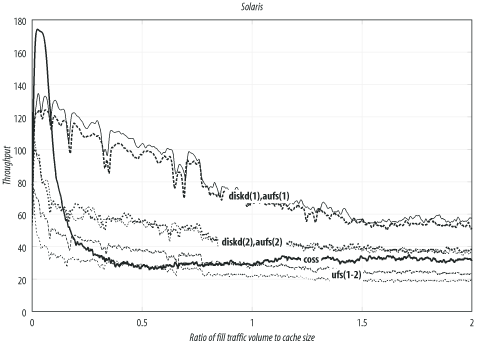D.7 Solaris
These results come from Solaris Version 8 for Intel (released February 2002). Solaris 9 was available when I started these tests, but Sun no longer makes it freely available. I tweaked the kernel by adding these lines to /etc/system:
set rlim_fd_max = 8192 set msgsys:msginfo_msgmax=8192 set msgsys:msginfo_msgmnb=8192 set msgsys:msginfo_msgmni=40 set msgsys:msginfo_msgssz=64 set msgsys:msginfo_msgtql=2048 set shmsys:shminfo_shmmax=2097152 set shmsys:shminfo_shmmni=32 set shmsys:shminfo_shmseg=16
Table D-5 and Figure D-5 summarize the Solaris results. This is the only other operating system, in addition to Linux, in which the aufs storage scheme works well. Interestingly, both aufs and diskd have about the same performance on Solaris, although the actual numbers are much lower than on Linux.
|
Storage scheme |
Filesystem |
Mount options |
Throughput |
Response time |
Hit ratio |
|---|---|---|---|---|---|
|
diskd(1) |
UFS |
noatime |
56.3 |
1.53 |
55.7 |
|
aufs(1) |
UFS |
noatime |
53.6 |
1.49 |
56.6 |
|
diskd(2) |
UFS |
37.9 |
1.53 |
55.5 | |
|
aufs(2) |
UFS |
37.4 |
1.49 |
56.4 | |
|
coss |
32.4 |
1.47 |
54.6 | ||
|
ufs(1) |
UFS |
noatime |
24.0 |
1.53 |
55.6 |
|
ufs(2) |
UFS |
19.0 |
1.50 |
56.3 |
Figure D-5. Solaris filesystem benchmarking traces

Solaris also supports coss, but at nowhere near the rates for Linux and FreeBSD. For some unknown reason, coss on Solaris is limited to 32 transactions per second.







